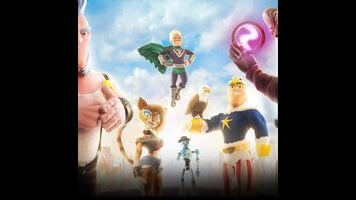SuperMansion gives superheroes the Robot Chicken treatment, to predictable results

If there’s one thing comic-book geeks love more than superheroes, it’s pointing out the ridiculousness of superheroes. SuperMansion creators Matthew Senreich and Zeb Wells, alongside co-executive producer Seth Green, have collectively epitomized that love/love-to-hate relationship in their long-running stop-motion Robot Chicken series for years. Sure, they’re making their Aquaman and Wonder Woman action figures say and do rude things to each other—but they do own the action figures in the first place.
SuperMansion, the trio’s animated Crackle series, plucks the superhero-centric bits from Robot Chicken’s quick-hit comedy cavalcade and fashions a half-hour sitcom out of the misadventures of The League Of Freedom, a team of largely inept superheroes led by aging Superman stand-in Titanium Rex, voiced by Breaking Bad’s Bryan Cranston (also an executive producer). Blundering out from the titular superhero clubhouse to battle evil (and accidentally topple a national monument here and there), the team is made up of the usual roster of eccentrically abled-and-costumed types.
There’s the ultra-patriotic American Ranger (voiced by Keegan-Michael Key), a Captain America simulacrum whose jingoistic, sexist, racist, homophobic worldview was the bee’s knees when he was frozen in a “time tunnel” at the end of WWII, but consistently gets him into hot water in the present. Black Saturn (Tucker Gilmore) is the gravel-voiced Batman type, here envisioned as a spoiled trust-fund baby, relying on gimmicks and his (living) parents’ cash to fuel his crime-fighting. Brad (Tom Root) is the resident bruiser, a pink-skinned ’roid head (he calls it “super serum”) prone to childish outbursts and gambling debts. Then there’s Cooch (Heidi Lynn Gardner), an anthropomorphic cat lady who has trouble curtailing her feline instincts and speaks in exaggerated “urban” patois. And, serving as the team’s majordomo, the robotic RoboBot (a funny name) undergoes an identity crisis in the pilot and rechristens himself Jewbot (sigh) once he discovers the ethnicity of his creator.
In expanding the Robot Chicken superhero brand, SuperMansion relies on the same stop-motion aesthetic, although on a much more polished, colorful scale (the characters’ mouths are no longer paper cutouts, for one thing). What hasn’t changed is Robot Chicken’s hit-or-miss comedy style, as the League’s adventures are couched in its predecessor’s signature mix of scatology and snarky finger-pointing, with the heroes standing in for targets both real-world and fictional. American Ranger and Titanium Rex, being of the (very) old school, constantly clash with the new generation’s self-absorption and lack of discipline. The younger heroes struggle to overcome their own neuroses and irresponsibility as they do battle with the likes of the Joker-esque prop comic villain The Groaner (who resists Black Saturn’s assertion that the two are locked in one of those “obsessive nemeses” relationships).
The voice cast is solid, especially (and not surprisingly) Cranston and Key, who give full-throated life to their characters’ bluster. Titanium Rex’s aging desperation to carry on his lifetime of heroics in the face of government cutbacks and bumbling teammates allows Cranston to bring an exasperated grumpy old man anger that’s consistently amusing. And Key—doing a booming, gung-ho clueless number very reminiscent of American Dad’s Stan Smith—matches Cranston’s commitment, making the two-fisted American Ranger (his demeanor and costume closer to joke Justice Leaguer General Glory than Captain America, really) both a mouthpiece and foil for his throwback hero’s right-wing sloganeering.
Although not involved in SuperMansion, the fingerprints of Seth Green’s Family Guy pal Seth MacFarlane can be seen pressed into the plasticine comic antics here as well. Apart from Key’s vocal similarity, American Ranger channels the MacFarlane comic style of saying offensive, button-pushing things (at one point, telling President Obama that he won’t tell anyone he saw him using the drinking fountain) before winking and walking (or, here, flying) away, content with having things both ways. In addition, SuperMansion’s superhero parody is spotty—for every pointed deconstruction of genre cliché (Black Saturn turns Batman’s relentlessness into self-important bullying much of the time), jokes more often aim for the most obvious cultural marker and blast away. (The very first shot in the pilot pans past a presidential museum case with “Bill Clinton’s ballgag” inside, for example.)
That shallowness is especially problematic when it comes to Cooch, who, from her name to her “sassy” demeanor, to her addiction to scratch tickets and cheap wine, to the fact that the only female on the team is both sexualized and sexually available, is a disaster of a character. If there’s a commentary here about how minorities or women (or female cat-people) are depicted in comics, it’s not evident at this point. (The fact that the only other recurring female character so far is American Ranger’s now-geriatric wife who’s been sleeping with Titanium Rex and whose dialogue consists entirely of the crudest double entendres doesn’t help matters.) The same goes for Jewbot, who immediately becomes the team’s accountant, installs a yarmulke and sidelocks, and makes endless Jewish jokes, the assumption being that Jewbot’s cluelessness allows the creators free rein to say offensive things. Again—having it both ways.
In the end, what’s most disappointing about SuperMansion’s first episodes is how underdeveloped its superhero milieu is. If Robot Chicken’s joke-a-minute structure encouraged disposable, rapid-fire zingers, SuperMansion’s expanded storytelling offers the chance to craft a more developed superhero satire. Instead, the show more often plays like a clayey version of the late, unlamented Drawn Together, which also banked on the idea that a houseful of crude fantasy characters (including a superhero) doing and saying would-be shocking things would never not be hilarious. SuperMansion finds a clever touch here and there—Jordan Peele pops up as the brilliantly named Bugula, a former villain whose sincere attempt to go straight infuriates Black Saturn—but viewers’ enjoyment of the series will largely depend on a tolerance for cartoon superheroes screwing, shitting, swearing, and making vibrator jokes.